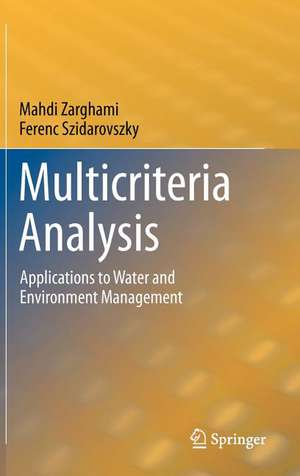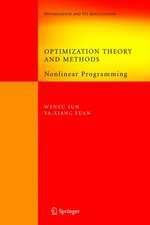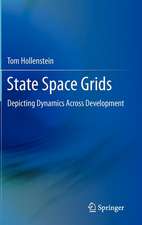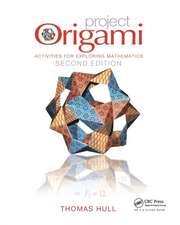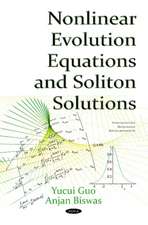Multicriteria Analysis: Applications to Water and Environment Management
Autor Mahdi Zarghami, Ferenc Szidarovszkyen Limba Engleză Hardback – 29 mai 2011
| Toate formatele și edițiile | Preț | Express |
|---|---|---|
| Paperback (1) | 381.00 lei 43-57 zile | |
| Springer Berlin, Heidelberg – 4 oct 2014 | 381.00 lei 43-57 zile | |
| Hardback (1) | 388.13 lei 43-57 zile | |
| Springer Berlin, Heidelberg – 29 mai 2011 | 388.13 lei 43-57 zile |
Preț: 388.13 lei
Nou
Puncte Express: 582
Preț estimativ în valută:
74.27€ • 77.74$ • 61.82£
74.27€ • 77.74$ • 61.82£
Carte tipărită la comandă
Livrare economică 31 martie-14 aprilie
Preluare comenzi: 021 569.72.76
Specificații
ISBN-13: 9783642179365
ISBN-10: 3642179363
Pagini: 172
Ilustrații: XI, 159 p.
Dimensiuni: 155 x 235 x 15 mm
Greutate: 0.42 kg
Ediția:2011
Editura: Springer Berlin, Heidelberg
Colecția Springer
Locul publicării:Berlin, Heidelberg, Germany
ISBN-10: 3642179363
Pagini: 172
Ilustrații: XI, 159 p.
Dimensiuni: 155 x 235 x 15 mm
Greutate: 0.42 kg
Ediția:2011
Editura: Springer Berlin, Heidelberg
Colecția Springer
Locul publicării:Berlin, Heidelberg, Germany
Public țintă
GraduateCuprins
1 Introduction to Multi Criteria Decision Analysis
1.1 Decision Analysis
1.2 The Components of MCDA Problems
1.3 Classification of MCDA Problems
2 The Hierarchy of the Criteria
2.1 Introduction
2.2 Criteria
2.3 Constructing the Hierarchy of the Criteria
3 Solution of Discrete MCDA Problems
3.1 Introduction
3.2Dominance Method
3.3 Sequential Optimization (SO)
3.4 The ε-Constraint Method (εCM)
3.5 Simple Additive Weighting (SAW)
3.6 Distance Based Methods (DBM)
3.7 The Analytic Hierarchy Process (AHP)
3.8 Other Methods
3.9 Case Studies
3.10 Discussions
4 Solution of Continuous MCDA Problems
4.1 Introduction
4.2 Dominance Method
4.3 Sequential Optimization
4.4 The ε-Constraint Method
4.5 Simple Additive Weighting
4.6 Distance Based Methods
4.7 Other Methods
4.8 Case Studies
4.9 Discussions
5 Social Choice Methods
5.1 Introduction
5.2 Social Choice Methods
5.3 Case Studies
5.4 Consensus on the Results
5.5 Discussions
6 Conflict Resolution Methods
6.1 Introduction
6.2 The Nash Bargaining Solution
6.3 The Non-symmetric Nash Solution
6.4 Area Monotonic Solution
6.5 Equal Loss Solution
6.6 Kalai-Smorodinsky Solution
6.7 Case Studies
6.8 Discussions
7 MCDA Problems under Uncertainty
7.1 Introduction
7.2 Probabilistic Methods
7.3 Fuzzy Methods
7.4 Probabilistic-Fuzzy MCDA Models
7.5 Case Studies
References
Appendix 1
Index
1.1 Decision Analysis
1.2 The Components of MCDA Problems
1.3 Classification of MCDA Problems
2 The Hierarchy of the Criteria
2.1 Introduction
2.2 Criteria
2.3 Constructing the Hierarchy of the Criteria
3 Solution of Discrete MCDA Problems
3.1 Introduction
3.2Dominance Method
3.3 Sequential Optimization (SO)
3.4 The ε-Constraint Method (εCM)
3.5 Simple Additive Weighting (SAW)
3.6 Distance Based Methods (DBM)
3.7 The Analytic Hierarchy Process (AHP)
3.8 Other Methods
3.9 Case Studies
3.10 Discussions
4 Solution of Continuous MCDA Problems
4.1 Introduction
4.2 Dominance Method
4.3 Sequential Optimization
4.4 The ε-Constraint Method
4.5 Simple Additive Weighting
4.6 Distance Based Methods
4.7 Other Methods
4.8 Case Studies
4.9 Discussions
5 Social Choice Methods
5.1 Introduction
5.2 Social Choice Methods
5.3 Case Studies
5.4 Consensus on the Results
5.5 Discussions
6 Conflict Resolution Methods
6.1 Introduction
6.2 The Nash Bargaining Solution
6.3 The Non-symmetric Nash Solution
6.4 Area Monotonic Solution
6.5 Equal Loss Solution
6.6 Kalai-Smorodinsky Solution
6.7 Case Studies
6.8 Discussions
7 MCDA Problems under Uncertainty
7.1 Introduction
7.2 Probabilistic Methods
7.3 Fuzzy Methods
7.4 Probabilistic-Fuzzy MCDA Models
7.5 Case Studies
References
Appendix 1
Index
Notă biografică
Dr. Mahdi Zarghami
is now assistant professor at the University of Tabriz, Iran. His main research and teaching fields are water resources management including water governance. He was visiting scholar at the University of Arizona and graduated PhD from Sharif University of Technology, Iran on watershed management at 2007. Some of his peer refereed papers are published in Water Resources Management, Journal of Stochastic Environmental Research and Risk Assessment, Journal of Water Resources Planning and Management, ASCE, Water International, Information Science, European Journal of Operational Research and etc. He also presented about 40 papers in national and international conferences in the fields of OR and water resources management. Prof. Ferenc Szidarovszky
received his Ph.D. in Mathematics from Eotvos University of Sciences of Budapest, Hungary, and a second Ph.D in economics from the Budapest University of Economic Sciences. He is also a recipient of two higher scientific degrees given by the Hungarian Academy of Sciences. In Hungary he held faculty positions with the Eotvos University of Sciences, University of Horticulture and Food Industry as well as with the Budapest University of Economic Sciences. Dr. Szidarovszky moved to the USA in 1987 and became a professor with the Systems and Industrial Engineering Department at the University of Arizona, and subsequently received a joint appointment with the Department of Hydrology and Water Resources. He has collaborated extensively with Dr. Vernon Smith, co-recipient of the 2002 Nobel Prize in Economics, and has been involved in many projects investigating theoretical issues and applications in mathematics, economics, and natural resources management. Dr. Szidarovszky is the author of 8 textbooks written in Hungarian, and he has published 11 textbooks and monographs in the USA. He is also the author of over 250 research publications in leading journals and has given many presentations in conferencesaround the world. He was recognized with the prestigious award (1998) “Dr. Habil in Engineering”, Budapest Technical University.
is now assistant professor at the University of Tabriz, Iran. His main research and teaching fields are water resources management including water governance. He was visiting scholar at the University of Arizona and graduated PhD from Sharif University of Technology, Iran on watershed management at 2007. Some of his peer refereed papers are published in Water Resources Management, Journal of Stochastic Environmental Research and Risk Assessment, Journal of Water Resources Planning and Management, ASCE, Water International, Information Science, European Journal of Operational Research and etc. He also presented about 40 papers in national and international conferences in the fields of OR and water resources management. Prof. Ferenc Szidarovszky
received his Ph.D. in Mathematics from Eotvos University of Sciences of Budapest, Hungary, and a second Ph.D in economics from the Budapest University of Economic Sciences. He is also a recipient of two higher scientific degrees given by the Hungarian Academy of Sciences. In Hungary he held faculty positions with the Eotvos University of Sciences, University of Horticulture and Food Industry as well as with the Budapest University of Economic Sciences. Dr. Szidarovszky moved to the USA in 1987 and became a professor with the Systems and Industrial Engineering Department at the University of Arizona, and subsequently received a joint appointment with the Department of Hydrology and Water Resources. He has collaborated extensively with Dr. Vernon Smith, co-recipient of the 2002 Nobel Prize in Economics, and has been involved in many projects investigating theoretical issues and applications in mathematics, economics, and natural resources management. Dr. Szidarovszky is the author of 8 textbooks written in Hungarian, and he has published 11 textbooks and monographs in the USA. He is also the author of over 250 research publications in leading journals and has given many presentations in conferencesaround the world. He was recognized with the prestigious award (1998) “Dr. Habil in Engineering”, Budapest Technical University.
Textul de pe ultima copertă
Multicriteria analysis is one of the most important fields of decision science. This book gives an outline of the formulation of an appropriate model and presents a comprehensive summary of the most popular methods for solving multicriteria decision problems. In addition to the classical approach the book introduces fuzzy and stochastic methodology, models with uncertainty, social choice and conflict resolution. All methods are illustrated with easy to follow simple examples. At the end of each chapter detailed case studies are given in water and environment management including inter-basin water transfer, urban water management, water allocation, groundwater quality management, forest treatment, ranking water resources projects, reservoir planning, water distribution network design and long-term watershed management. The new methodology and the wide variety of case studies are not easily accessible elsewhere.
Caracteristici
Comprehensive summary of classical and new methodology Detailed case studies in water resources management Uncertainty is treated by both fuzzy and stochastic methods Social choice and conflict resolution are also discussed
